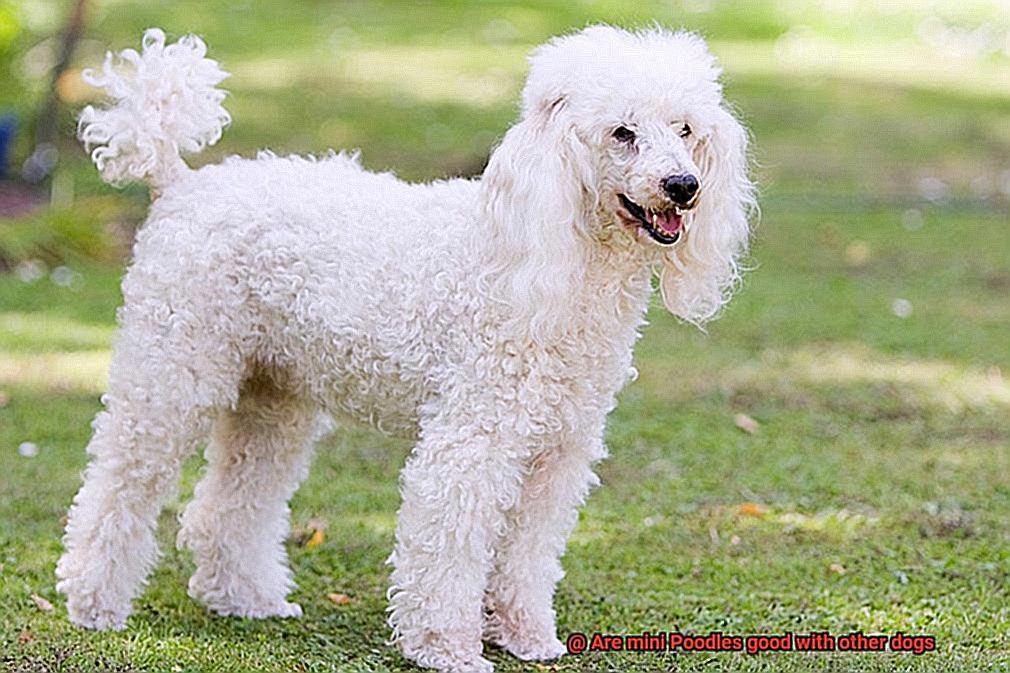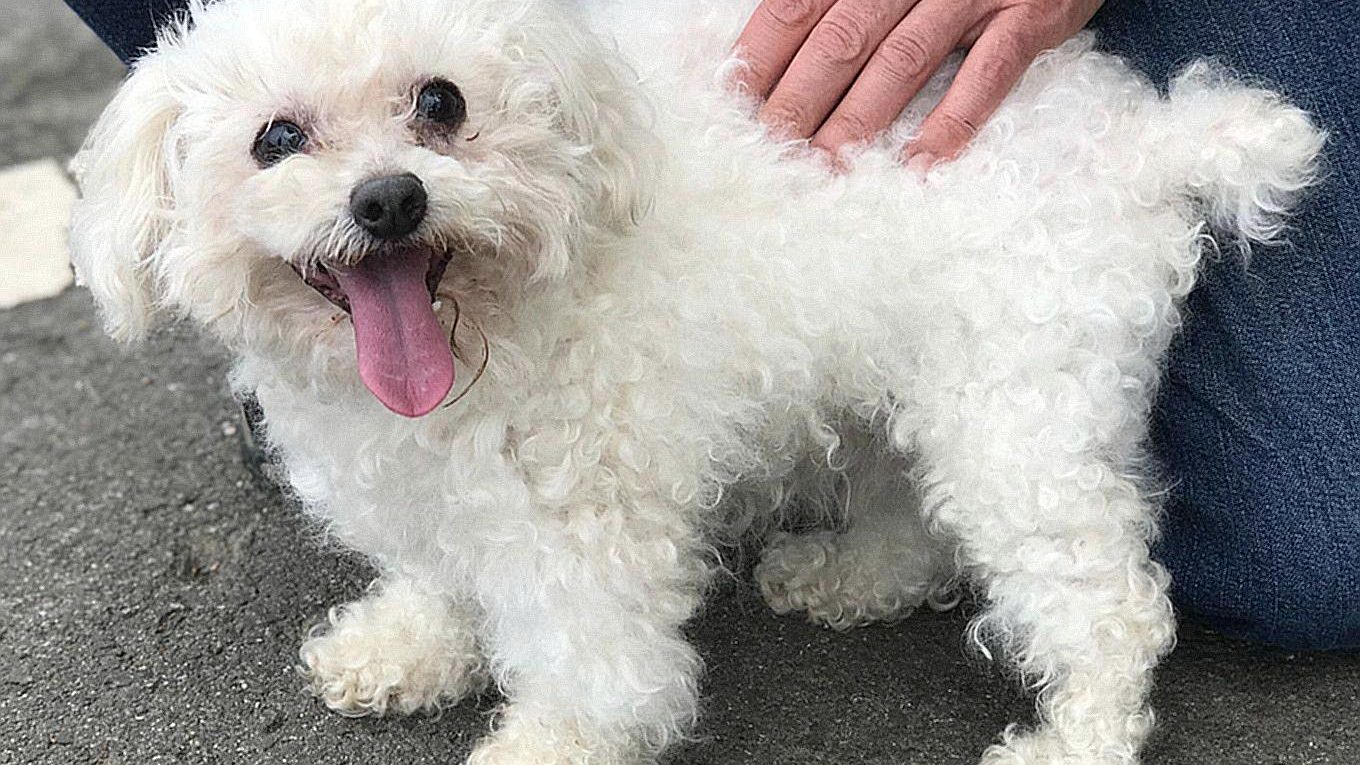Are mini Poodles good with other dogs?
Welcome to our blog, where we’re about to embark on a wild ride into the world of mini Poodles and their doggy companions.
If you’re a Poodle parent who’s pondering the idea of expanding your fur family or just someone who can’t resist those fluffy little bundles of joy, you’ve come to the right spot. Mini Poodles are like tiny dynamos, packed with smarts, playfulness, and oodles of love.
But when it comes to mingling with other dogs, do they play nice? Stick around as we unravel this mystery, uncovering their social skills, potential hurdles, and pro tips for making introductions go swimmingly.
Trust us – this blog post is gonna be pawsome.
The Personality of Mini Poodles: What to Expect
Contents
- 1 The Personality of Mini Poodles: What to Expect
- 2 Socialization for Mini Poodles: How to Prepare Them for Other Dogs
- 3 Compatibility between Mini Poodles and Other Dogs
- 4 Introducing a Mini Poodle to Another Dog: Tips and Best Practices
- 5 Training a Mini Poodle for Interactions with Other Dogs
- 6 Some Mini Poodles May Have a Reserved Nature: How to Handle It
- 7 Professional Guidance for Handling Fear or Aggression in Mini Poodles Around Other Dogs
- 8 Conclusion
Well, fret not. Mini Poodles are known for their lively and friendly personalities, making them great companions for other dogs. In this article, we’ll explore the sociable nature of mini Poodles and provide insights on what to expect when introducing them to other dogs.
Lively and Playful Personalities:
Mini Poodles are full of energy and love to play. Their lively and playful nature often makes them a perfect match for the spirited French Bulldog. They’ll engage in games, chase each other around, and have a blast together. Their energy levels usually align well, ensuring hours of fun and companionship.
Intelligent and Eager to Please:
One of the remarkable traits of mini Poodles is their high intelligence. They are quick learners and eager to please their owners, which makes introducing them to other dogs a breeze. With consistent training and socialization, mini Poodles can easily adapt to new canine friends, including French Bulldogs.
Affectionate and Loving:
Mini Poodles are known for their affectionate nature. They form strong bonds with their family members, including other dogs. When introduced properly, they’ll shower your French Bulldog with love and attention. Get ready for heartwarming moments of cuddles and snuggles between these two adorable breeds.
Early Socialization is Key:
To ensure harmonious interactions, early socialization is crucial for mini Poodles. Exposing them to various breeds, sizes, and temperaments from a young age helps them become well-rounded and adaptable in social situations. Consider enrolling your mini Poodle in puppy classes or organizing supervised playdates with other dogs to foster positive experiences.
Monitor Interactions and Provide Training:
While mini Poodles are generally friendly, monitoring their interactions with other dogs is vital. Some mini Poodles may have a dominant personality, so it’s important to ensure they are respectful and not overly assertive towards your French Bulldog. Basic obedience training, including commands like sit, stay, and recall, can help establish control during social interactions.
Seek Professional Help if Needed:
If you notice any signs of fear, aggression, or discomfort in your mini Poodle when interacting with other dogs, don’t hesitate to seek professional guidance. A dog behaviorist or trainer can assess the situation and provide tailored advice on how to manage and improve your mini Poodle’s social skills.
Conclusion:
With their sociable nature and compatibility with other dogs, mini Poodles make fantastic companions for French Bulldogs. Their lively and playful personalities, combined with intelligence and affection, create a harmonious environment for both breeds.
Socialization for Mini Poodles: How to Prepare Them for Other Dogs
Socialization is an essential aspect of raising a well-rounded and happy mini Poodle. By exposing them to different dogs and environments from a young age, you can help them develop the necessary skills to interact confidently and appropriately with other canines. Here are some steps to prepare your mini Poodle for interactions with other dogs:
- Start early: Begin socializing your mini Poodle as early as 8-12 weeks old, during their critical developmental period. This is when they are most receptive to new experiences and are more likely to form positive associations with other dogs.
- Controlled introductions: Gradually introduce your mini Poodle to well-behaved and friendly dogs in a calm and controlled environment. Start with short and supervised meetings, and gradually increase the duration and complexity of the interactions.
- Monitor body language: Pay close attention to the body language of both your mini Poodle and the other dogs during introductions. Look for signs of fear, aggression, or discomfort. If either dog shows stress, separate them and try again later.
- Positive reinforcement: Reward your mini Poodle with treats, praise, and affection when they exhibit calm and friendly behavior towards other dogs. This will help them associate positive experiences with social interactions.
- Expose to different situations: Gradually expose your mini Poodle to various types of dogs and environments. This can include visits to dog parks, obedience classes, or arranging playdates with well-socialized dogs.
- Consistency is key: Provide regular opportunities for positive interactions with other dogs. Schedule playdates or walks with dog-friendly neighbors or consider enrolling them in doggie daycare where they can interact under supervision.
Remember that each mini Poodle is unique, and some may have different levels of sociability. Respect their individual temperament while still providing opportunities for positive social experiences. If you need assistance or are struggling with the socialization process, consult a professional dog trainer or behaviorist for guidance.

Compatibility between Mini Poodles and Other Dogs
Look no further. As an expert in dog compatibility, I’m here to shed some light on the factors that influence the compatibility between mini Poodles and other dogs, specifically French Bulldogs.
- Temperament: Mini Poodles are generally known for their friendly and sociable nature, making them compatible with other dogs. However, it’s important to remember that individual temperament can vary. Some mini Poodles may be more outgoing and eager to make new friends, while others may be more reserved or selective in their interactions.
- Socialization: Proper socialization from a young age is essential for determining a mini Poodle’s compatibility with other dogs. By exposing them to different breeds, sizes, and temperaments of dogs early on, you can help them develop positive interactions and good social skills. This is particularly important for mini Poodles who may have a protective nature towards their owners.
- Playfulness: Mini Poodles have a playful nature and often enjoy the company of other dogs. Their energy levels and love for interactive play sessions make them great companions for other active dogs, like French Bulldogs. Just imagine the fun-filled playdates they could have.
- Introductions: When introducing a mini Poodle to your French Bulldog or any other dog, it’s crucial to do so in a controlled environment. This helps prevent potential conflicts or misunderstandings between the dogs. Supervision is key during the initial introduction, especially if one or both dogs are not familiar with each other.
- Age Considerations: Age can also play a role in compatibility. Younger mini Poodles tend to be more adaptable and tolerant, making them more likely to get along with other dogs. Older mini Poodles may have established preferences and may take longer to adjust to new dog introductions. Patience is key.
- Professional Guidance: If you’re unsure about introducing a mini Poodle to your French Bulldog, seeking professional guidance from a dog behaviorist or trainer can be beneficial. They can provide the proper techniques, training, and behavior modification if needed, ensuring a smooth transition for both dogs.
Remember, while mini Poodles are generally good with other dogs, individual differences exist. Always monitor your dogs’ behavior and intervene if any signs of aggression or discomfort arise. With proper socialization, supervision, and a bit of love, your mini Poodle and French Bulldog could become the best of pals.
Introducing a Mini Poodle to Another Dog: Tips and Best Practices
Bringing a new furry friend into your home is an exciting adventure, but it’s important to introduce your Mini Poodle to your French Bulldog properly. While both breeds have unique personalities, with the right approach, they can become the best of friends. Here are some tips to help you navigate this process and create a harmonious relationship between your Mini Poodle and French Bulldog.
Begin with Socialization:
Start by socializing both your Mini Poodle and French Bulldog from a young age. Expose them to different environments, people, and animals, including other dogs. This will help them develop confidence and positive associations with new experiences, reducing the chances of fear or aggression when meeting each other.
Neutral Territory:
Choose a neutral location for their first meeting, like a park or a friend’s backyard. Avoid introducing them in either dog’s home territory as this can lead to territorial behavior. By starting on neutral ground, you create an even playing field where neither dog feels the need to defend their space.
Controlled Introduction:
Keep both dogs on leashes during the initial meeting. Allow them to sniff and observe each other from a safe distance while closely monitoring their body language. Look for signs of stress or aggression, such as growling, raised fur, or stiff body language. If any of these signs are present, separate the dogs and try again later.
Gradual Progression:
As the dogs become more comfortable with each other, gradually decrease the distance between them while still keeping them on leashes. Reward calm and friendly interactions with treats and praise. If either dog shows signs of discomfort or aggression, separate them and consult with a professional dog trainer or behaviorist for guidance.
Patience is Key:
Remember that every dog is an individual and may require different amounts of time to adjust to one another. Some dogs may become fast friends within a few meetings, while others may take weeks or even months before they feel comfortable together. Be patient and allow them to set the pace.
Training a Mini Poodle for Interactions with Other Dogs
We understand the importance of fostering positive relationships between our furry friends, and in this section, we will delve into the significance of training, socialization, and close monitoring when it comes to introducing your Mini Poodle to other dogs.
Training for Success:
- Temperament and Behavior: Recognize that Mini Poodles, like any breed, can vary in their temperament and behavior towards other dogs. Training plays a crucial role in ensuring your Mini Poodle is well-behaved and comfortable during interactions with fellow canines.
- Socialization Matters: Expose your Mini Poodle to a variety of dogs from a young age (between 3 to 14 weeks) to enhance their social skills. Puppy socialization classes, playdates, and supervised visits to dog parks are great ways to achieve this.
- Positive Reinforcement: Employ positive reinforcement training techniques when teaching your Mini Poodle how to interact with other dogs. Reward them with treats, praise, and playtime for displaying appropriate behavior. Avoid punishment or scolding, as this can create fear or aggressive tendencies.
- Obedience Training: Basic obedience commands such as “sit,” “stay,” and “come” are essential tools for maintaining control in potentially challenging situations. Consistent and frequent training sessions will help your Mini Poodle understand and obey these commands reliably.
Close Monitoring:
- Gradual Exposure: If your Mini Poodle displays fear or aggression towards other dogs, utilize gradual exposure and desensitization techniques. Start from a distance and gradually decrease it over time to help build confidence and positive associations.
- Body Language Awareness: Pay close attention to your Mini Poodle’s body language during interactions with other dogs. Signs of fear or discomfort, such as cowering or growling, should be addressed immediately. Seek professional guidance if needed.
Some Mini Poodles May Have a Reserved Nature: How to Handle It
Mini Poodles are known for their intelligence, elegance, and delightful personalities. However, just like humans, they can have varying temperaments and personalities. Some Mini Poodles may have a reserved nature, which can be attributed to genetics or early socialization experiences. In this blog post, we will explore effective strategies to handle and support your Mini Poodle’s reserved nature.
Understanding Your Mini Poodle’s Reserved Nature:
- Respect their boundaries: It’s important to understand that some Mini Poodles prefer their personal space. Respect their need for alone time and provide them with a safe and quiet place where they can retreat when they feel overwhelmed.
- Gradual socialization: Instead of forcing interactions with other dogs, focus on gradual introductions. Choose calm and well-behaved dogs for these encounters to ensure positive experiences. Allow your Mini Poodle to approach new dogs at their own pace, rewarding calm and relaxed behavior.
- Positive reinforcement training: Utilize positive reinforcement techniques to encourage confident behavior around other dogs. Reward your Mini Poodle with treats, praise, or play when they exhibit calm and relaxed behavior during interactions.
- Professional guidance: If you find yourself struggling to handle your Mini Poodle’s reserved nature, consider seeking professional help from a qualified dog behaviorist or trainer. They can provide personalized guidance and create a training plan tailored to your dog’s specific needs.
While some Mini Poodles may have a reserved nature, it does not mean they cannot develop positive relationships with other dogs. By respecting their boundaries, focusing on gradual socialization, utilizing positive reinforcement techniques, and seeking professional guidance if needed, you can help your Mini Poodle overcome their reservations and thrive in the company of other dogs. Remember, patience, understanding, and proper handling are key in supporting your Mini Poodle’s unique personality and temperament.
Professional Guidance for Handling Fear or Aggression in Mini Poodles Around Other Dogs
However, just like us humans, our furry friends can sometimes face challenges in social situations. If your Mini Poodle exhibits fear or aggression towards other dogs, don’t fret. In this guide, we’ll provide you with expert tips and strategies to help your Mini Poodle overcome these hurdles and become a social butterfly. So, grab a cup of coffee and let’s dive in.
Seek Professional Guidance:
When it comes to fear or aggression issues, it’s always best to consult with a professional dog trainer or behaviorist. These experts specialize in working with fearful or aggressive dogs and can assess the underlying causes of your Mini Poodle’s behavior. They will provide you with a tailored training plan to address the issue effectively.
Desensitization and Counter-Conditioning:
One popular technique used by professionals is desensitization and counter-conditioning. This involves gradually exposing your Mini Poodle to other dogs in controlled environments while rewarding calm and positive behavior. Start with distance and intensity levels that your dog can handle comfortably, increasing the difficulty as they become more relaxed and confident.
Teach Alternative Behaviors:
Redirecting your Mini Poodle’s attention during encounters with other dogs can be highly effective. Teach them alternative behaviors, such as focusing on you and performing commands. This not only redirects their attention but also helps them feel more secure in these situations.
Consistency is Key:
Consistency is crucial when dealing with fear or aggression in Mini Poodles. Stick to the training plan provided by your professional, ensuring everyone in the household follows it consistently. Remember, Rome wasn’t built in a day, so be patient as your furry friend progresses.
Medication as a Last Resort:
In some cases, medication prescribed by a veterinarian may be necessary to manage fear or aggression. Always consult with a professional before considering this option, as it should be part of a comprehensive training plan.
Socialization is Prevention:
Prevention is always better than cure. Proper socialization from an early age and positive experiences with other dogs greatly reduce the chances of fear or aggression issues arising. So, continue socializing your Mini Poodle and exposing them to different canine interactions to maintain their positive behavior.
D7jvGCM9H60″ >
Conclusion
In conclusion, mini Poodles are excellent companions for other dogs, making them the perfect playmates for breeds like French Bulldogs. With their lively and playful personalities, combined with their intelligence and affectionate nature, mini Poodles create a harmonious environment that both breeds can thrive in. However, it’s important to remember that individual temperament can vary, so early socialization is crucial to ensure positive interactions.
To prepare your mini Poodle for meeting other dogs, start socializing them from a young age and expose them to various breeds, sizes, and temperaments. Watch their body language during introductions and reward calm and friendly behavior. Consistency in training and seeking professional help if needed are also vital factors in ensuring successful interactions.
When introducing your mini Poodle to another dog, begin with socialization exercises. Choose a neutral territory for the first meeting and keep both dogs on leashes initially. Gradually decrease the distance between them while closely monitoring their body language. Remember to be patient as each dog may take different amounts of time to adjust to one another.
Training a mini Poodle for interactions with other dogs involves recognizing their unique temperament and behavior patterns. Socialize them from a young age using positive reinforcement techniques and closely monitor their interactions. If your mini Poodle has a reserved nature or displays fear or aggression towards other dogs, respect their boundaries and gradually introduce them to new experiences with positive reinforcement training. Seeking professional guidance can also be beneficial in these situations.
Overall, by understanding the personality traits of mini Poodles and following these tips for introducing them to other dogs, you can foster positive relationships between your furry friends and ensure they live harmoniously together.




